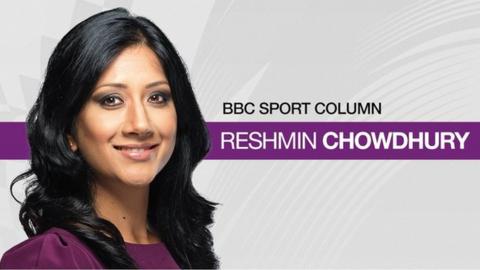
Reshmin Chowdhury is a sports broadcaster, a Muslim and a mother of two. For Women’s Sport Week she looked at projects which engage Asian women, and showcases those who are breaking down barriers and paving the way for the next generation to enjoy playing sport.
We Muslim women come in all guises. We come from different cultures, communities and backgrounds.
We have different tastes and preferences on how we live our lives and navigate our careers. Some of us wear hijabs, some don’t. Some have families who are supportive, some who aren’t and others that take a little more convincing.
I used my own personal experience as a starting point – the irony of being a sports broadcaster who never actually played sport.
I grew up in an extremely open-minded, progressive Bengali Muslim family and within a huge second-generation community where education, culture, religion and music were the cornerstones of my upbringing.
Despite watching so much sport, playing it was never seen as important. It wasn’t until my mid-30s, two children later, when I changed my mindset.
What began as a vanity exercise has now become an integral part of my daily life. I go to the gym five times a week and I have benefitted mentally and physically in more ways than I can list. I have never looked back.
This was almost, but not quite, the same hook for our piece: introducing sport to a group of women who had never considered it in any form. In the case of the Muslim Women’s Network, this applied to some women who had been victims of abuse.
When sports consultant Janie Frampton became a patron of the Birmingham-based charity, she and executive director Faeeza Vaid decided to introduce a sporting arm. The aim was to use sport as a vital component in the rehabilitation of victims.
With this summer’s Women’s Cricket World Cup as a springboard, they’ve arranged for their members to attend one of the showpiece matches – Pakistan against India on 2 July – and have launched a targeted scheme specifically designed to encourage participation.
So how about the women who didn’t need encouraging?
We were fortunate to meet an inspiring few who never saw their uniqueness as a barrier to achieving top-level success. Yet the overriding sense was that in order to reach that higher level, the onus was on them to adapt to their environment.
First up was the Muslim Women’s Sport Foundation’s new trustee and former rounders international, Dana Abdulkarim.
Dana holds the honour of being the first hijabi athlete to represent England in any sport and then went on to become Britain’s first hijabi PE teacher. She is challenging stereotypes at every turn and even adapted the rules of rounders to accommodate wearing a headscarf.
Cricket is certainly a sport in which several Muslim women have made their mark. Salma Bi was born into a cricket-mad family and is the first woman from the Islamic faith to be selected for Worcestershire.
Amna Rafiq, whose brother Azeem was the youngest player to captain Yorkshire, made it her mission to make the sport accessible to young Asian girls, when she became frustrated by a lack of infrastructure growing up. Both women have won accolades for their efforts.
Fast forward to the next generation and 16-year-old Anisa Ansar is breaking records in her category for Hampshire and England.
The challenges they have faced have been varied. However, they have all had to adapt to accommodate the sporting world, rather than the other way around. For Salma, the lack of female role models made her more determined to be a pioneer.
She used the fact that she looked different to her advantage, but admits having to work twice as hard. This was echoed by Anisa, who spoke honestly about the challenges of breaking into a sport which is still largely white and middle class, not to mention expensive.
Coming from a less-privileged background meant she encountered a very different, yet real, barrier to entry. Anisa also wore a headscarf, which she later adapted to a bandana, so she could wear a cricket helmet. Similarly, Dana had to get clearance to wear her hijab in rounders.
There is definitely a willingness from all sides to make sport more open to women across the board, the much-lauded This Girl Can campaign is testament to that. In the run-up to the World Cup, the ECB has launched the Women’s Soft Ball Festival, a nationwide initiative to encourage more females to play.
This and many other programmes are much needed and so welcome. However, challenges remain for Muslim women who want to take sport to the next level.
They already face barriers from within their communities: unconventional career choices are never easy to explain and not everybody will immediately be on board, whatever the background.
However, in the wider world, there perhaps needs to be a more targeted approach when offering facilities and nurturing real talent to reach that elite level, more movement to find that halfway point.
This is no exact science and time could well be a factor, but the example of young Anisa only serves to reinforce the idea that top-level sport is still not seen as “normal” for Muslim women.
Sport has certainly advanced a great distance and this brand of “kick-ass” women is living proof of what can be achieved.
Of course, success breeds success and that is why I feel that celebrating both the difficulties and achievements of these brilliant Muslim women is so vital in moving forward.
I only hope that by the time my five-year-old daughter is old enough, she will be able to consider a career in a wide variety of sports without hesitation, as well as enjoy the benefits long before I ever did.



